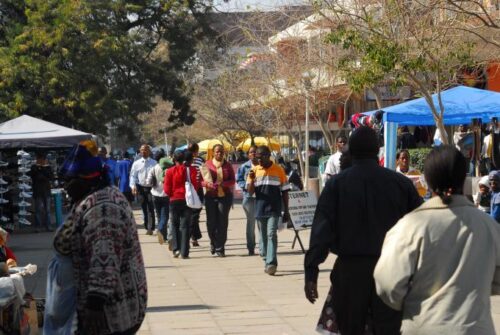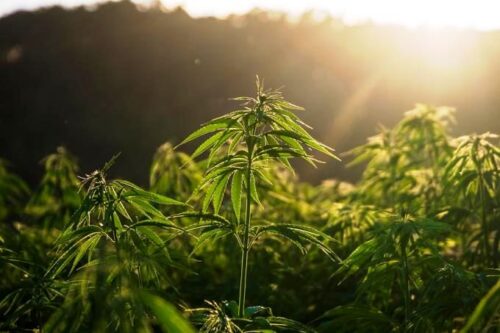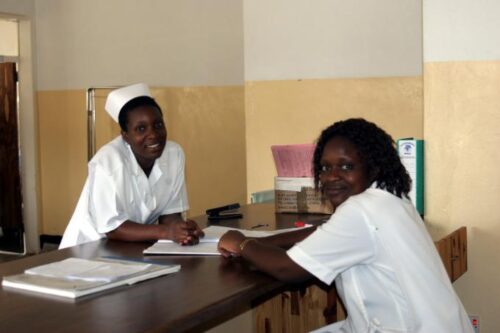Consumption and national legislation.

After decades of harsh prohibition, several African states have opted for policies that tend to liberalize or decriminalize the use of narcotic substances, especially those considered light.
Drug use is on the rise across the continent, with even greater increases expected for years to come. According to data from the World Health Organization, cannabis continues to be the most widely used substance in Africa, with the highest incidence in West and Central Africa. The relative consumption rate is between 5.2% and 13.5%.
In second place on a continental level are amphetamine-like stimulants, such as ecstasy, along with methamphetamines. About 3.7% use injecting drugs, with very high risks of contracting diseases such as AIDS and hepatitis B and C.

Botswana. Sub-Saharan Africa contributes about 16% of world drug use. File swm
In Africa, as is the case in the rest of the world, those who tend to use drugs are young men aged between 25 and 39 years. However, in parallel with the female conquests in African societies, the use of drugs – including injectables – also tends to become more gender-balanced, especially in large urban centres such as Lagos or Luanda. Changes to the structural elements in many African societies favour the use of drugs: growing unequally, unemployment and psychological stress are all proven reasons (as already described in a 2012 study, World Drug Report) which tend to favour drug use. And such conditions appear to be present in most African countries, especially the more urbanized ones, such as Nigeria, South Africa, Ghana, and Angola, not to mention the countries of northern Africa.
All these factors offer a projection for 2050 (presented in a study by ENACT) according to which Africa will be the continent with the greatest increase in drug use, going from a consumer audience of around 9 million in 2015 to around 23 million in 2050. An increase comparable only to that of Southeast Asia, while the traditional markets (Europe and Central Asia) show constant or slightly decreasing curves.
Health systems in crisis
Within the African continent, drug use is more concentrated in the western part, with about 6 million users, followed by the eastern (2 million), southern, northern, and central regions. In total, sub-Saharan Africa contributes about 16% of world drug use. These data are throwing Africa’s already weak public health systems into crisis. From mental disorders deriving from the use of drugs, especially opiates, to infective endocarditis caused by the use of drugs injected with syringes that pass from one consumer to another: the crisis of African health systems is easily predictable, in a very short space of time.
Forbid or legalise
At the legislative level, after decades of harsh prohibition, several African states have opted for policies that tend to liberalize or decriminalize the use of narcotic substances, especially those considered light, cannabis in the first place. This was done, in most cases, to allow the pharmaceutical use of these substances, as happened in 2021 in Morocco, which allowed the therapeutic use of cannabis. Similar measures have been taken in recent years by Rwanda, South Africa, Lesotho, Zambia, and Zimbabwe. One of the reasons for this change in legislation must be sought in economic convenience, on the part of these countries, in legalizing the cultivation by states.

Cannabis field. The African contribution to world cannabis production is around 11%. Photo: NickyePe/Pixabay
Already today, the African contribution to world cannabis production is around 11%. With the legislative measures just adopted, this figure is destined to rise, with great economic benefits for the respective states, as well as for the families who are dedicated to the cultivation of cannabis. An example: in Morocco, about 73,000 hectares of land are destined for this crop, concentrated in the Rif mountains, with great economic benefits for local communities. A few years ago, there were almost 150 thousand hectares, and the Moroccan government has tried to drastically reduce the production of cannabis, with evident economic damage for the almost 800 thousand Moroccan citizens who depend on the cultivation of this plant. Also because of this situation, which would have reduced an entire region to hunger, the Rabat parliament voted in favour of legalizing the cultivation of cannabis, the production of which is therefore destined to rise in the coming years.
Open questions
If the economic impact of these measures is positive, many observers express doubts about other types of consequences that the liberalization of the cultivation of cannabis and similar plants could bring. A text by Kebogile Mokwena, published in 2019 in the African Journal of Primary Health Care & Family Medicine, presents all these doubts.

Zambia. Nurses in the hospital. The increase in cannabis use will lead to greater stress on health structures. File swm
First, according to the author, the increase in cannabis use will be inevitable; a fact that will lead to greater stress on health structures, especially with respect to mental disorders, reduced efficacy of antiretroviral treatments against AIDS (still widespread in all southern African countries, especially in South Africa and Mozambique) and negative implications for tuberculosis patients, as well as for pregnant women who may possibly use cannabis during pregnancy. In short, the way for the regulation of the so-called soft drugs in Africa is not at all clear or homogeneous among the various states, even if the economic benefits and the pressures of the farmers’ movements seem to be operating in favour of a process of gradual liberalization.
Luca Bussotti



